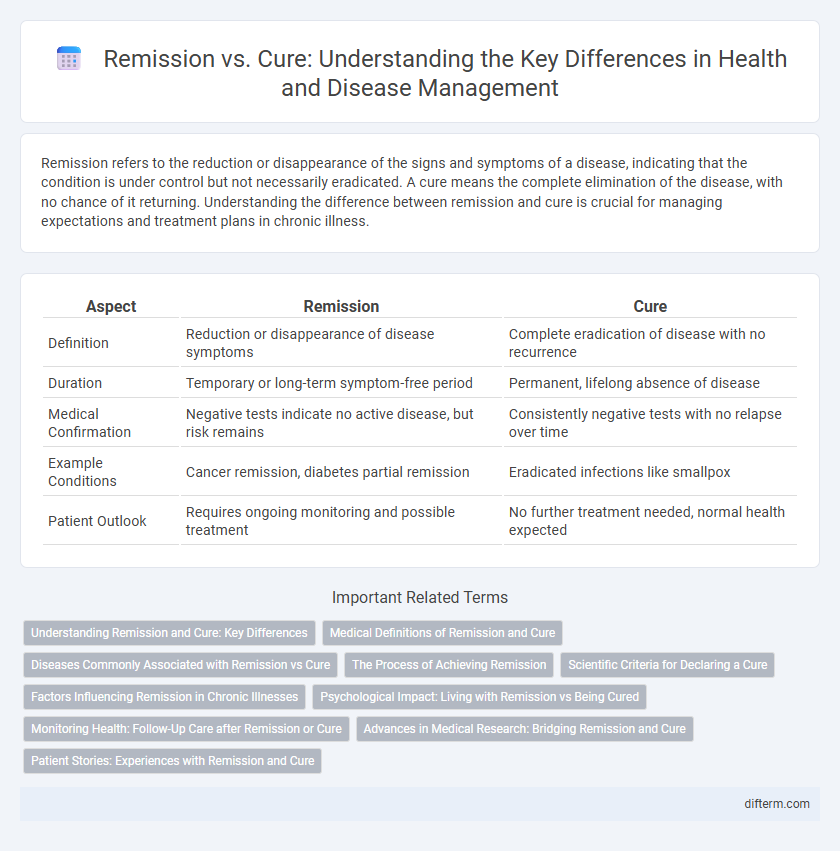Remission refers to the reduction or disappearance of the signs and symptoms of a disease, indicating that the condition is under control but not necessarily eradicated. A cure means the complete elimination of the disease, with no chance of it returning. Understanding the difference between remission and cure is crucial for managing expectations and treatment plans in chronic illness.
Table of Comparison
| Aspect | Remission | Cure |
|---|---|---|
| Definition | Reduction or disappearance of disease symptoms | Complete eradication of disease with no recurrence |
| Duration | Temporary or long-term symptom-free period | Permanent, lifelong absence of disease |
| Medical Confirmation | Negative tests indicate no active disease, but risk remains | Consistently negative tests with no relapse over time |
| Example Conditions | Cancer remission, diabetes partial remission | Eradicated infections like smallpox |
| Patient Outlook | Requires ongoing monitoring and possible treatment | No further treatment needed, normal health expected |
Understanding Remission and Cure: Key Differences
Remission refers to the reduction or disappearance of signs and symptoms of a disease, often indicating that the illness is under control but not necessarily eradicated. A cure means the complete elimination of the disease with no chance of recurrence. Understanding these key differences helps patients and healthcare providers manage expectations and treatment plans effectively.
Medical Definitions of Remission and Cure
Remission refers to the reduction or disappearance of the signs and symptoms of a disease, often indicating that the disease is under control but not necessarily eradicated. Cure implies the complete elimination of a disease with no signs of its return and restoration of normal health. Medical definitions distinguish remission as a temporary or indefinite period of symptom-free status, while cure denotes a permanent resolution of the illness.
Diseases Commonly Associated with Remission vs Cure
Remission is often associated with chronic diseases like cancer, diabetes, and multiple sclerosis, where symptoms decrease or disappear temporarily but the disease might return. Cure implies complete eradication of diseases such as bacterial infections or some acute illnesses, resulting in no trace of the disease remaining. Understanding the distinction aids in managing expectations for conditions like rheumatoid arthritis or HIV, where remission is a realistic goal while a definitive cure remains elusive.
The Process of Achieving Remission
Achieving remission involves a systematic reduction of disease symptoms through targeted treatments such as chemotherapy, radiation, or medication, aiming to lower detectable disease activity without necessarily eradicating it completely. Regular monitoring through diagnostic tests and clinical evaluations is crucial to assess the effectiveness of therapy and maintain remission status. This controlled state can vary in duration, emphasizing ongoing medical management and lifestyle adjustments to sustain patient health.
Scientific Criteria for Declaring a Cure
Scientific criteria for declaring a cure require the complete and sustained absence of disease indicators verified through rigorous diagnostic tests, such as imaging, laboratory assays, and molecular markers. Remission signifies a temporary reduction or disappearance of symptoms but does not guarantee eradication of the underlying pathology or prevent recurrence, making ongoing monitoring essential. The distinction hinges on long-term follow-up data confirming no disease activity without the need for continued treatment, which remains the gold standard in clinical research and practice.
Factors Influencing Remission in Chronic Illnesses
Factors influencing remission in chronic illnesses include the severity of the disease, patient adherence to treatment plans, and genetic predispositions. Effective management strategies such as medication compliance, lifestyle modifications, and regular medical monitoring significantly increase the likelihood of achieving and maintaining remission. Environmental factors, psychological support, and early diagnosis also play crucial roles in improving remission outcomes in chronic conditions.
Psychological Impact: Living with Remission vs Being Cured
Living with remission often involves ongoing anxiety and uncertainty about disease recurrence, significantly affecting mental health and overall well-being. In contrast, being cured can provide psychological relief and a sense of closure, reducing stress and improving quality of life. Understanding these psychological impacts is crucial for tailored mental health support in chronic illness management.
Monitoring Health: Follow-Up Care after Remission or Cure
Monitoring health after remission or cure involves regular follow-up care including physical exams, lab tests, and imaging to detect any recurrence or late effects of treatment. Personalized surveillance plans based on the type of illness and treatment received optimize early detection and improve long-term outcomes. Consistent communication with healthcare providers supports managing symptoms and maintaining overall health post-treatment.
Advances in Medical Research: Bridging Remission and Cure
Advances in medical research have significantly narrowed the gap between remission and cure by improving targeted therapies and personalized medicine approaches. Cutting-edge treatments such as immunotherapy and gene editing enable sustained disease control and potential eradication of conditions once deemed chronic or terminal. Ongoing clinical trials and biomarker discoveries drive the development of precision interventions that transform remission into durable, complete cures.
Patient Stories: Experiences with Remission and Cure
Patients often share diverse experiences with remission and cure, emphasizing how remission involves periods of symptom reduction or disease inactivity without guaranteeing permanent healing. Many recount the emotional challenges of navigating remission's uncertainty, contrasting it with the definitive relief reported in stories of cure. These personal narratives highlight the critical importance of ongoing medical monitoring and support to maintain health and quality of life.
Remission vs Cure Infographic

 difterm.com
difterm.com